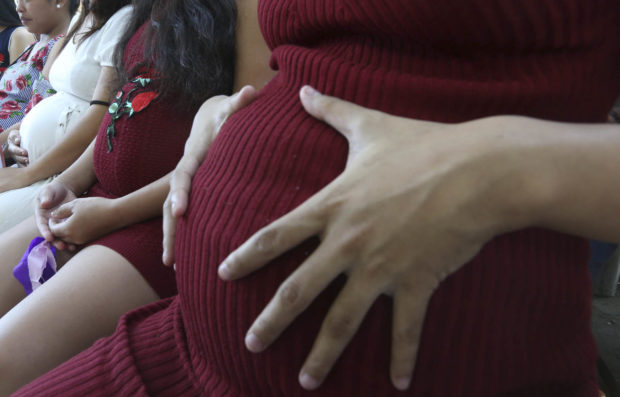
Pregnant teenagers (File photo by MARIANNE BERMUDEZ / Philippine Daily Inquirer)
MANILA, Philippines — The Commission on Population and Development (PopCom) praised on Wednesday the signing of Executive Order No. 141, which makes programs to prevent teenage pregnancy a national priority and mandates relevant agencies to work together to solve the issue.
The order would help PopCom address gaps in efforts to prevent teen pregnancy, according to Health Undersecretary Juan Antonio Perez III, executive director of the commission.
He noted that the EO cites figures from the Philippine Statistics Authority (PSA) that show 183,967 live births in 2018 and 180,916 in 2019 among teenagers.
The figures translate to an average of 504 live births per day for females aged 10 to 19 years old in 2018 and 495 live births per day for the same category in 2019.
Perez hopes the order, which President Rodrigo Duterte signed on June 25, will push both houses of Congress to help the executive department fill the gaps in providing family planning and reproductive health services to teenagers who are pregnant or have just given birth.
The order directs the government is come up with practical solutions to teenage pregnancy, like implementing a comprehensive sexual education, creating employment opportunities for young people, and placing reproductive health infomercials in various media.
“It also calls for youth and community mobilization, as Sanggunian Kabataan units are also enjoined ‘to develop interventions and prevent all known causes of adolescent pregnancies’ while supporting adolescent mothers,” PopCom said.
“The EO invokes the National Youth Council to ‘establish a forum for continuing dialogue between the government and the youth sector on…proper planning and evaluation of policies, programs, and projects affecting the youth’,” it added.
The order also requires the Department of Budget and Management to ensure that the annual national budget would include allocations for programs aimed at preventing teenage pregnancies.
Even before the onset of the COVID-19 pandemic, PopCom and other reproductive health advocates had already raised concern about teenage pregnancies.
On Valentine’s Day in 2020, Perez started campaigning for the restoration of the original provision in the Reproductive Health Law requiring the distribution of contraceptives to adolescents who had given birth or suffered miscarriages.
During the pandemic, PopCom warned that more teenagers might get pregnant as lockdowns forced them to stay at home and spend more time with their partners.
When the data came out, authorities were more alarmed: PopCom said that pregnancy among girls aged below 15 increased by 7 percent in 2019.

